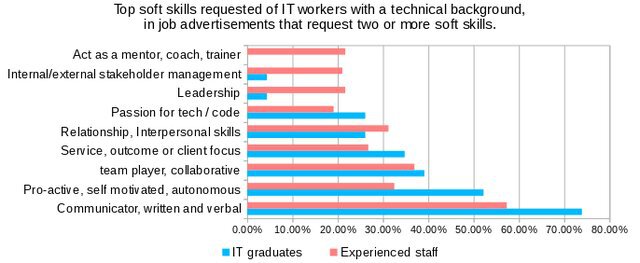Soft Skills
Soft skills are the skills required to work collaboratively and effectively with others. This includes team mates, bosses, colleagues in other specializations, customers, users and more. For some, acquiring these skills is harder than acquiring the technical skills.
Soft skills are typically developed through reflecting on experiences. Sometimes a trusted mentor can assist by providing a neutral viewpoint and suggesting alternative strategies.
Many believe that soft skills cannot be developed, at all. That you stop developing as a person at Primary, High School or University (depending on the person holding the view). Whilst common, this is not a view we hold. Our view is that you will continue to grow and develop throughout your life as you acquire and reflect on new experiences.
Soft skills are highly transferable between jobs. The skills you acquire at, for example, McDonalds or on a fruit orchid will include; learning how to interact with different people, take direction from others more experienced, offer advice to those with less experience, work together on a common goal and do all this whilst keeping a collegial atmosphere. When you observe managers, often they are paid big salaries because they have learned how to effectively and positively manage people.
The
BE Graduate attributes contains a range of soft skills you should develop through your experiences in both study and work experience.
ECS Research into Soft Skills

Another source is
ECS research into what the Wellington IT Industry means by soft skills. This research highlighted, through two different methods, what soft skills are sought by industry.
The first was through an analysis of job advertisements on Seek using the keywords "ICT" and "Wellington". This search provided 543 advertisements over a three week period. The advertisements were analyzed for soft skills, finding 60% of those advertisements mentioned two or more. The skills found were then grouped and are displayed in the graph shown here.
The second involved interviewing industry employers and conducting focus groups. In total 294 soft skills were detailed, 264 from the 22 interviews plus a further 30 in the focus groups. The following eight categories capture the main themes and are listed in decreasing order of occurrence.
- Communication. Written, verbal and body language. The ability to be clear, articulate, to the point, inclusive and take the audience on a journey. Recognition that different mediums need different treatment.
- Interpersonal skills. Building trust and relation-ships, remembering names, picking up on social cues,adapt to talking with peers, seniors or clients, comfortable being yourself, respect for others.
- Managing yourself. Being self-motivated, completing tasks, showing initiative, good work ethic and sense of timeliness, doing what is asked, being ready to participate and offer opinions while acknowledging there is more to learn.
- Attitude. Glass half full optimism, pro-active, positive, confident and curious. Willing to learn, able to take feedback and adaptable.
- Aptitude. Ability to apply existing technical skills to seek out alternatives and learn new skills fast. Able to interpret requirements and problem solve.
- Understand business drivers. Being client outcome focused, aware of business costs and business imperatives. The confidence to express a view while acknowledging it may be someone else’s call.
- Teamwork. Adopting a sense of responsibility to the team and respecting others for what they can contribute. Able to resolve conflicts and contribute to team success without degrading relationships.
- Cultural fit. Fit socially, not necessarily outside work, but definitely in work. Treat the receptionist and the cleaner with respect, recognize everyone is there to help. Avoid “playing the rules”, for example, using up every sick day.
 Another source is ECS research into what the Wellington IT Industry means by soft skills. This research highlighted, through two different methods, what soft skills are sought by industry.
The first was through an analysis of job advertisements on Seek using the keywords "ICT" and "Wellington". This search provided 543 advertisements over a three week period. The advertisements were analyzed for soft skills, finding 60% of those advertisements mentioned two or more. The skills found were then grouped and are displayed in the graph shown here.
The second involved interviewing industry employers and conducting focus groups. In total 294 soft skills were detailed, 264 from the 22 interviews plus a further 30 in the focus groups. The following eight categories capture the main themes and are listed in decreasing order of occurrence.
Another source is ECS research into what the Wellington IT Industry means by soft skills. This research highlighted, through two different methods, what soft skills are sought by industry.
The first was through an analysis of job advertisements on Seek using the keywords "ICT" and "Wellington". This search provided 543 advertisements over a three week period. The advertisements were analyzed for soft skills, finding 60% of those advertisements mentioned two or more. The skills found were then grouped and are displayed in the graph shown here.
The second involved interviewing industry employers and conducting focus groups. In total 294 soft skills were detailed, 264 from the 22 interviews plus a further 30 in the focus groups. The following eight categories capture the main themes and are listed in decreasing order of occurrence.
